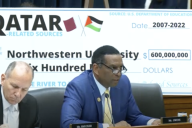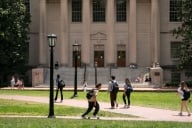You have /5 articles left.
Sign up for a free account or log in.
An investigation into claims Arizona State University entered into an unethical deal with publisher Cengage has concluded there is “no evidence” the university did anything wrong.
The report, published this week, was prompted by allegations from Brian Goegan, a former economics professor at ASU, which went viral last month.
Goegan claimed the university had received a large financial grant from Cengage in exchange for choosing courseware from the publisher. He also said he was required to fail 30 percent of his students in order to set a new baseline to make it seem that the new courseware was improving outcomes.
The university flatly denied Goegan’s claims. The student government called for an external review, and ASU subsequently asked former Arizona Supreme Court chief justice Ruth McGregor to look into the issue.
McGregor did not find any evidence of a grant from Cengage but said ASU and Cengage have a revenue-sharing arrangement. She did not consider this arrangement unethical.
Her report concluded that ASU instructors were not mandated to fail 30 percent of their students. She did, however, acknowledge in a footnote that Goegan was “counseled” on the fact that his grades were “considerably higher than the department distribution.” Historically, 27 percent of students had either failed or withdrawn from the economics courses, she said.
“I don’t understand how they could claim there is no policy and then admit that I was spoken to and reprimanded about not conforming with the policy,” Goegan said to The Arizona Republic.
Goegan described the report as “disappointing” and limited in scope.








